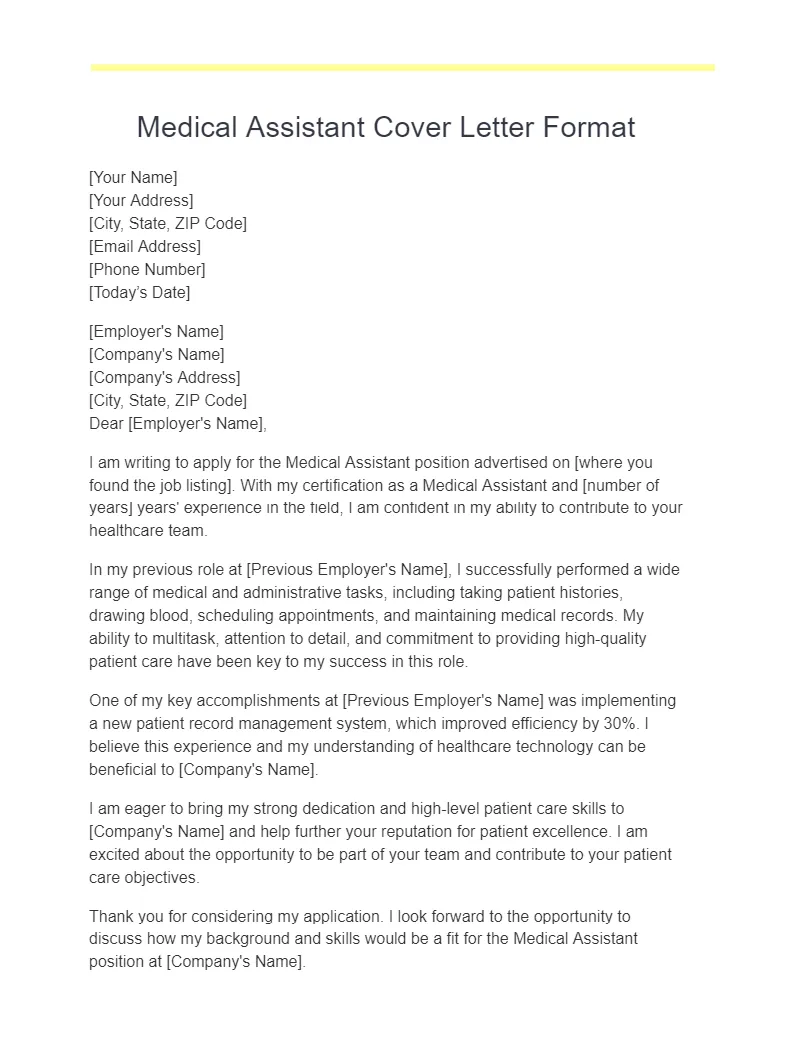What is a Cover Letter for Medical Assistant?
A cover letter for medical assistant jobs is a crucial document that accompanies your resume when applying for positions in the healthcare field. It serves as an introduction to your skills, experience, and personality, allowing you to showcase why you are the ideal candidate. Unlike a resume, which provides a factual overview of your qualifications, a cover letter gives you the opportunity to express your enthusiasm for the role and explain why you are a great fit for the specific clinic or hospital. It’s your chance to make a strong first impression and persuade the hiring manager to invite you for an interview. A well-crafted cover letter can significantly increase your chances of getting hired as a medical assistant.
Key Components of a Cover Letter
A successful cover letter consists of several key components that work together to create a compelling narrative. Each section plays a vital role in presenting you as a well-rounded and suitable candidate. The structure typically includes your contact information, the date, and the recipient’s details at the top. This is followed by a professional greeting, and the body of the letter, where you highlight your relevant skills and experience, and express your passion for healthcare. A strong cover letter will specifically mention why you are interested in the particular clinic or hospital, demonstrating that you’ve done your research. The letter concludes with a call to action, expressing your gratitude for the opportunity and your availability for an interview, and of course, a professional closing and your signature. Ensuring that all these components are included and well-written is essential for a cover letter that stands out.
Your Contact Information

Start your cover letter by providing your contact information. This includes your full name, address, phone number, and professional email address. Make sure the email address is professional and easy to read. This information should be placed at the top of the letter, either left-aligned or centered. Double-check that all the details are accurate and up-to-date. Incorrect contact information can lead to missed opportunities, as the hiring manager needs a reliable way to reach you if they decide to move forward with your application. Presenting your contact information in a clear, concise manner is the first step in making a professional impression and ensuring your application process goes smoothly.
Date and Recipient Information
Following your contact information, include the date and the recipient’s details. Begin with the current date. Then, include the name of the hiring manager or the relevant department head (if known), their title, the clinic or hospital’s name, and the address. If you are applying to a large organization and are unsure of the specific hiring manager’s name, try to find this information online or through the job posting. Addressing the cover letter to a specific person, rather than a generic title like ‘To Whom It May Concern,’ adds a personal touch and shows that you have taken the initiative to learn more about the company. This level of attention to detail indicates your genuine interest in the position and increases the likelihood of your application being noticed.
A Compelling Greeting
Your greeting sets the tone for the entire cover letter. Use a professional greeting, such as ‘Dear Mr./Ms. [Last Name]’ if you know the hiring manager’s name. If the name is unknown, you can use a more general greeting like ‘Dear Hiring Manager’ or ‘Dear [Department Name] Hiring Committee.’ Avoid overly casual greetings like ‘Hi’ or ‘Hello.’ The greeting should be respectful and demonstrate that you have taken the time to address the letter appropriately. A well-crafted greeting establishes a positive first impression and signals that you are taking the application process seriously. Proper grammar and spelling are crucial here, as they set the standard for the rest of your writing.
Highlighting Your Skills and Experience
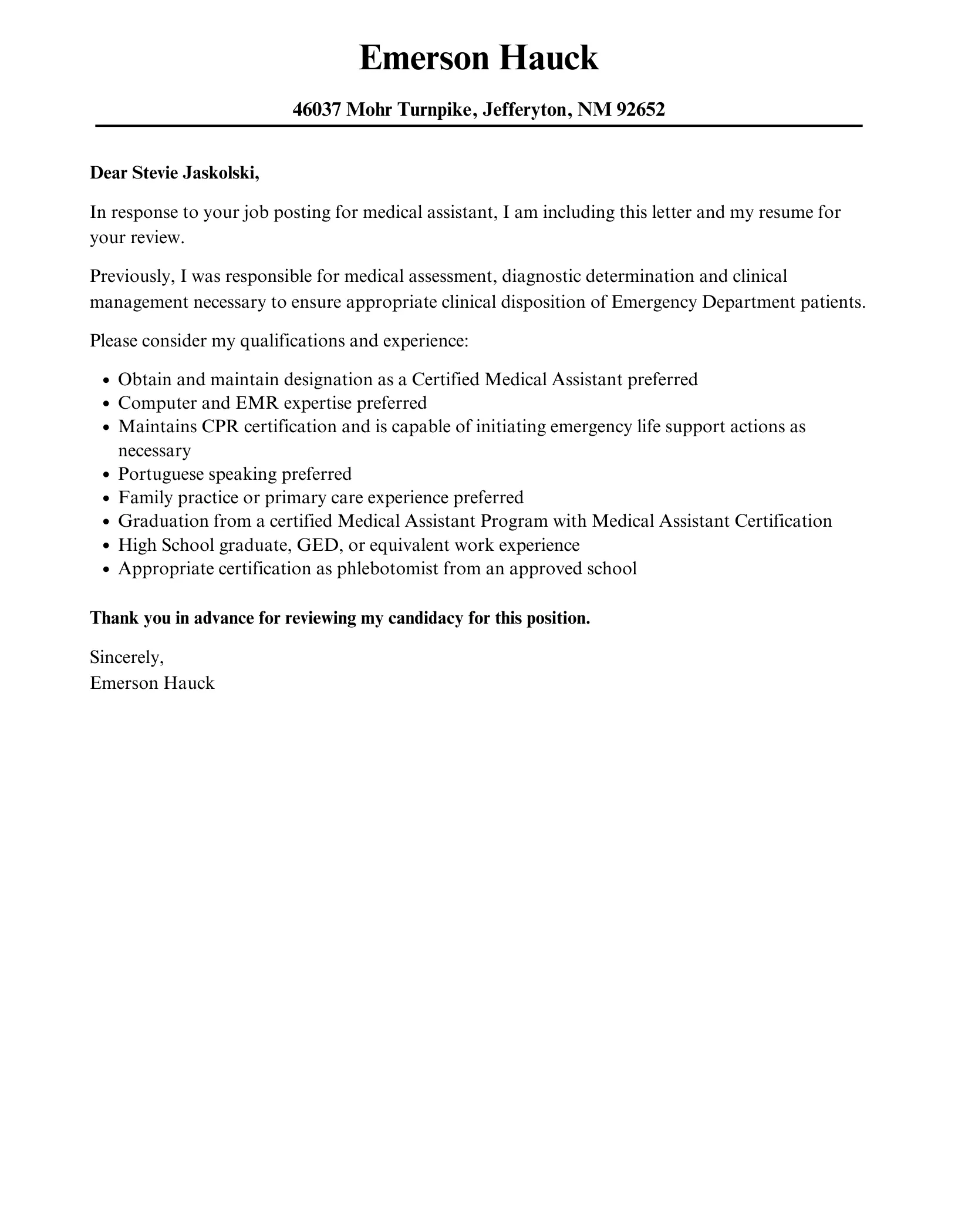
The body of your cover letter is where you showcase your skills and experience. This is the heart of your cover letter, where you demonstrate your capabilities and qualifications for the medical assistant position. Start by mentioning the specific job you are applying for and where you saw the job posting. Next, highlight the most relevant skills and experiences that align with the requirements of the job. Use specific examples to illustrate your abilities and achievements. Quantify your accomplishments whenever possible; for instance, mention the number of patients you assisted daily, the efficiency improvements you helped implement, or any specialized training you possess. Tailor the content to match the job description, focusing on what the employer is looking for and providing evidence to support your claims. This section is your chance to tell a story about why you are the best candidate for the role.
Medical Assisting Skills to Showcase
When highlighting your skills, focus on those most relevant to medical assisting. These skills can be a combination of technical and soft skills. Some examples include taking patient medical histories and vital signs, assisting physicians with examinations and procedures, performing basic laboratory tests, and administering medications. Also, emphasize your proficiency in electronic health records (EHR) systems, such as those used for documentation and record-keeping. Make sure to include any specific certifications, such as Certified Medical Assistant (CMA) or Registered Medical Assistant (RMA), which are often highly valued by employers. Tailoring this part of the letter to match the requirements mentioned in the job description demonstrates that you have carefully considered the role and are well-suited for it.
Relevant Experience Examples
Provide specific examples to demonstrate your experience in action. Instead of just stating you have experience with patient care, describe a situation where you provided exceptional care. For instance, you can describe how you managed a busy clinic, handled difficult patients with empathy, or improved patient satisfaction scores. If you have experience with specific medical procedures like phlebotomy or injections, detail your proficiency in these areas. If you’ve used specialized equipment or software, be sure to mention that too. Use the STAR method (Situation, Task, Action, Result) to structure your examples: Describe the situation, the task you were assigned, the actions you took, and the positive result of your efforts. This approach helps the hiring manager understand how you’ve used your skills effectively in the past and how you can contribute to their team.
Demonstrating Your Passion for Healthcare
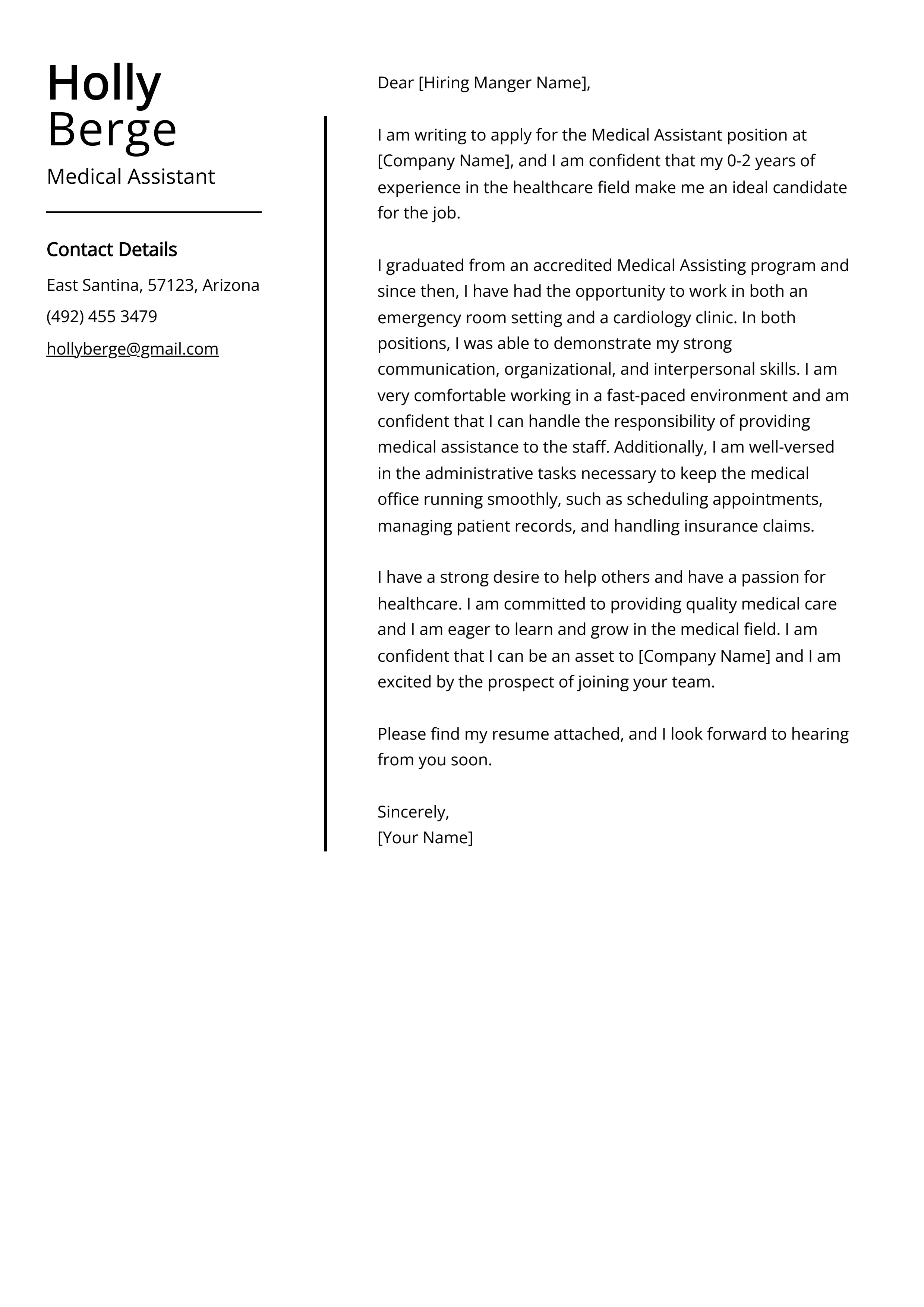
Expressing your passion for healthcare is an important part of your cover letter. It allows you to connect with the hiring manager on a personal level and shows your genuine interest in the field. Share why you are drawn to a career in medical assisting. Is it your desire to help people, your fascination with medicine, or your commitment to patient care? Mention specific experiences that have reinforced your passion, such as volunteering in a healthcare setting or personal experiences that have motivated you to pursue this path. This is your opportunity to show that you are not just looking for a job, but that you are dedicated to making a difference in the lives of patients. Your enthusiasm and commitment will set you apart from other applicants and leave a lasting impression.
Why This Specific Clinic or Hospital?
Show that you have researched the specific clinic or hospital and explain why you are interested in working there. Mention any values or mission statements that resonate with you, any specific programs or services offered that interest you, or any achievements by the clinic that have impressed you. Your research demonstrates that you are truly interested in the organization and not just sending out a generic application. This could also be your chance to mention any mutual connections, such as knowing someone who works at the clinic, or having a positive experience as a patient there. A well-researched and personalized message shows your commitment and enhances your chances of getting an interview.
Showcasing Your Soft Skills
Soft skills are often overlooked but essential in medical assisting. Employers seek candidates who possess strong interpersonal and communication abilities. Highlight your ability to work as part of a team, your empathy and compassion for patients, and your ability to remain calm under pressure. Mention your skills in active listening, conflict resolution, and your willingness to learn new things. Use examples that illustrate these soft skills. For instance, explain how you handled a difficult patient, how you collaborated with a colleague to solve a problem, or how you adapted to a new medical procedure. Soft skills show that you are a well-rounded professional who can contribute positively to the workplace environment, making you a more appealing candidate to the hiring manager.
Communication and Interpersonal Abilities
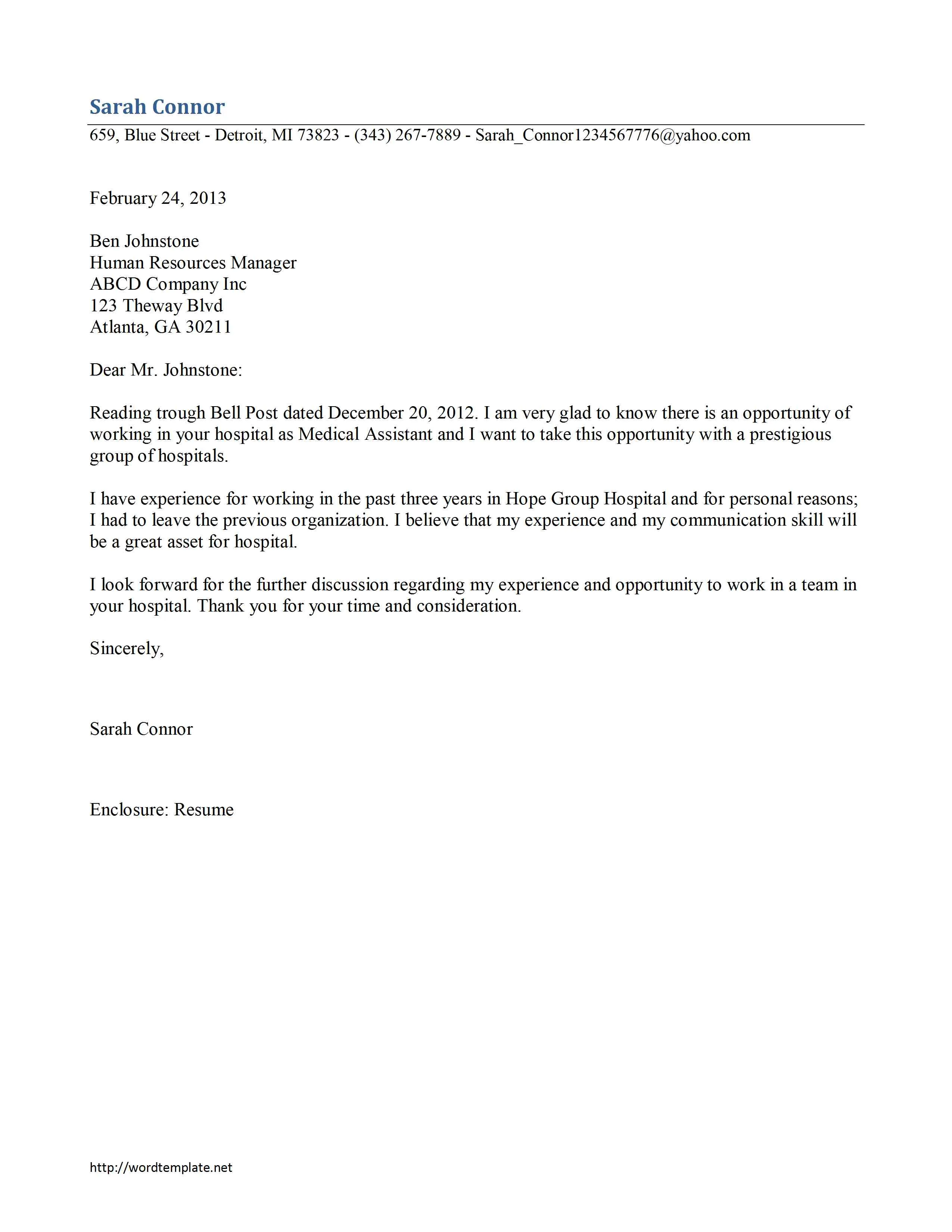
Communication and interpersonal skills are essential for a medical assistant, and they should be highlighted in your cover letter. Emphasize your ability to communicate clearly and effectively with patients, physicians, and other healthcare professionals. Give examples of situations where you successfully explained medical instructions to patients or resolved communication conflicts. Highlight your active listening skills and your capacity for empathy. Mention your comfort in interacting with people from diverse backgrounds and age groups. Describe how you handle sensitive patient information with discretion and maintain confidentiality. Your goal is to demonstrate your capability to build rapport with patients and coworkers, making your application more appealing to the hiring manager. Highlighting your communication skills reinforces your ability to provide quality care.
Attention to Detail and Organization
Attention to detail and organizational skills are crucial traits in the medical field. These are the skills that are sought after to ensure patient safety. Showcase your ability to manage multiple tasks, stay organized, and maintain accurate records. Give examples of how you have demonstrated precision in the past. Did you consistently manage patient appointments, maintain accurate medical records, or assist with inventory management? Mention your ability to adhere to protocols and follow instructions carefully. If you have experience using electronic health records (EHR) systems, be sure to highlight that, as accuracy and organization are essential for that process. Illustrating these skills can give the hiring manager confidence in your ability to perform the job correctly, ensuring a smooth and efficient workflow in the clinic.
Closing the Cover Letter
The closing of your cover letter should be professional and leave a lasting impression. Thank the hiring manager for their time and consideration. Reiterate your interest in the position and your eagerness to contribute to the team. Express your enthusiasm for the opportunity and make it clear that you are excited about the possibility of an interview. State your availability for an interview and how you can be reached, whether it is via phone or email. A clear and concise closing reinforces your professionalism and helps the hiring manager understand that you are ready for the next step. Finish with a professional closing, such as ‘Sincerely,’ ‘Best regards,’ or ‘Thank you,’ followed by your typed name. These closing remarks are part of the final touch to showcase your potential.
Expressing Gratitude and Offering Availability
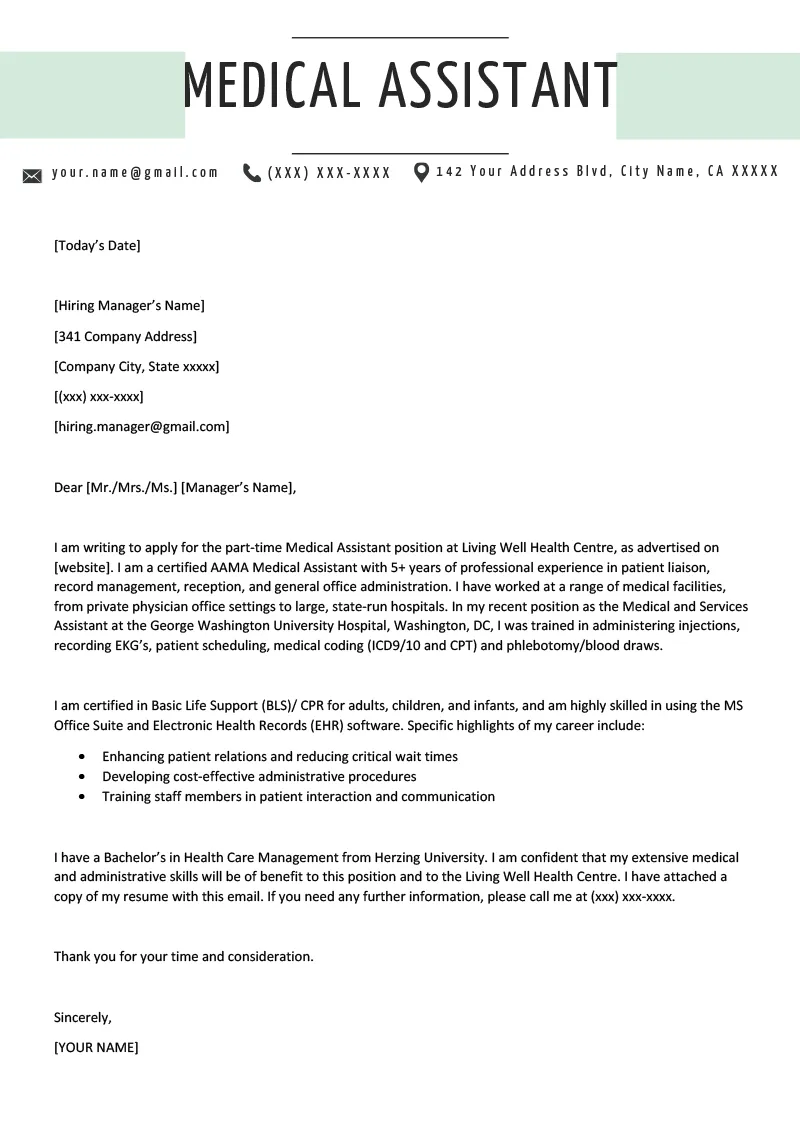
Expressing your gratitude and offering your availability is a key part of your closing. Thank the hiring manager for considering your application and for their time in reviewing your documents. Then, reiterate your interest in the position and state your eagerness to learn more about the role. Clearly state your availability for an interview, specifying how they can reach you to schedule one. This could include your phone number and email address. Make it easy for the hiring manager to contact you and show your readiness to move forward in the hiring process. This final section helps you to end on a positive note and reinforces your commitment to the position.
Proofreading and Final Touches
Before submitting your cover letter, always proofread it carefully. Check for any grammatical errors, spelling mistakes, or punctuation errors. Ensure the formatting is consistent and easy to read. It’s recommended to have a friend, family member, or career counselor review your cover letter as a fresh pair of eyes can catch errors that you might have missed. Pay attention to the tone and language used in the letter, making sure it is professional and appropriate for the healthcare environment. Proofreading is an important step that demonstrates your attention to detail and your commitment to presenting yourself professionally. Correcting any errors ensures that your cover letter is polished and that you’re making the best possible impression on the hiring manager.
